Slayer talk right hands, Repentless and, er, Salt-N-Pepa
In-depth with Kerry King and Gary Holt
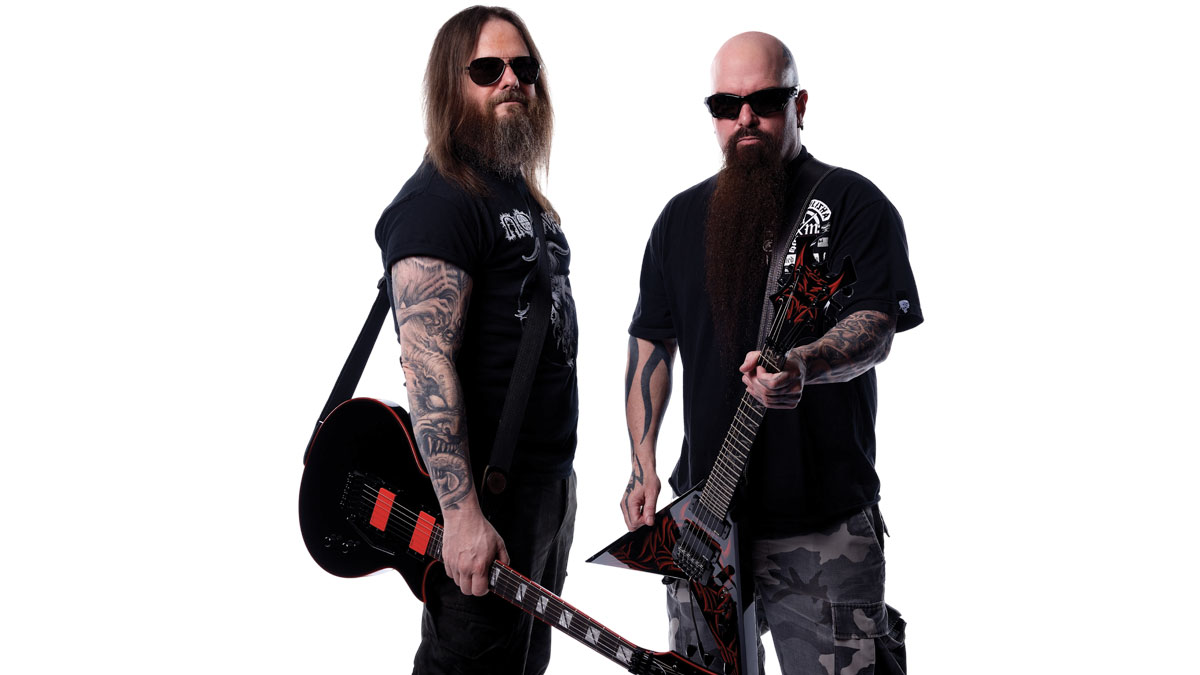
Introduction
Thrash pioneers Slayer have returned with their first album since the death of founding guitarist Jeff Hanneman. We get the story behind the biggest metal album of the year...
There are countless heavy metal bands, but there will only ever be one Slayer. Since forming in 1981, they’ve become much more than just a band: they’re an institution for maniacs that want their music louder and prouder.
They’ve become much more than just a band: they’re an institution for maniacs that want their music louder and prouder
Even compared to their Big Four peers - Metallica, Megadeth and Anthrax - theirs was an evil most pure indeed. It was faster and more aggressive than their contemporaries, yet somehow more barbaric at the same time. With third album Reign In Blood, they defined heavy metal and they’ve been pretty much defending the faith ever since.
But in May 2013, their world was turned upside down when founding guitarist Jeff Hanneman died of alcohol-related liver disease. He’d already been absent from the stage for two years after contracting necrotising fasciitis, a rare flesh-eating disorder, with old friend and Exodus guitarist Gary Holt stepping in to fill stage right.
This year’s 11th album, Repentless, is in many ways a tribute to their fallen brother and also heralds a new era with only half of what many fans consider their classic lineup. Guitarists Kerry King and Gary Holt tell us it’s certainly something they’re aware of, but more importantly, it holds no ground on the legitimacy of Slayer in 2015…
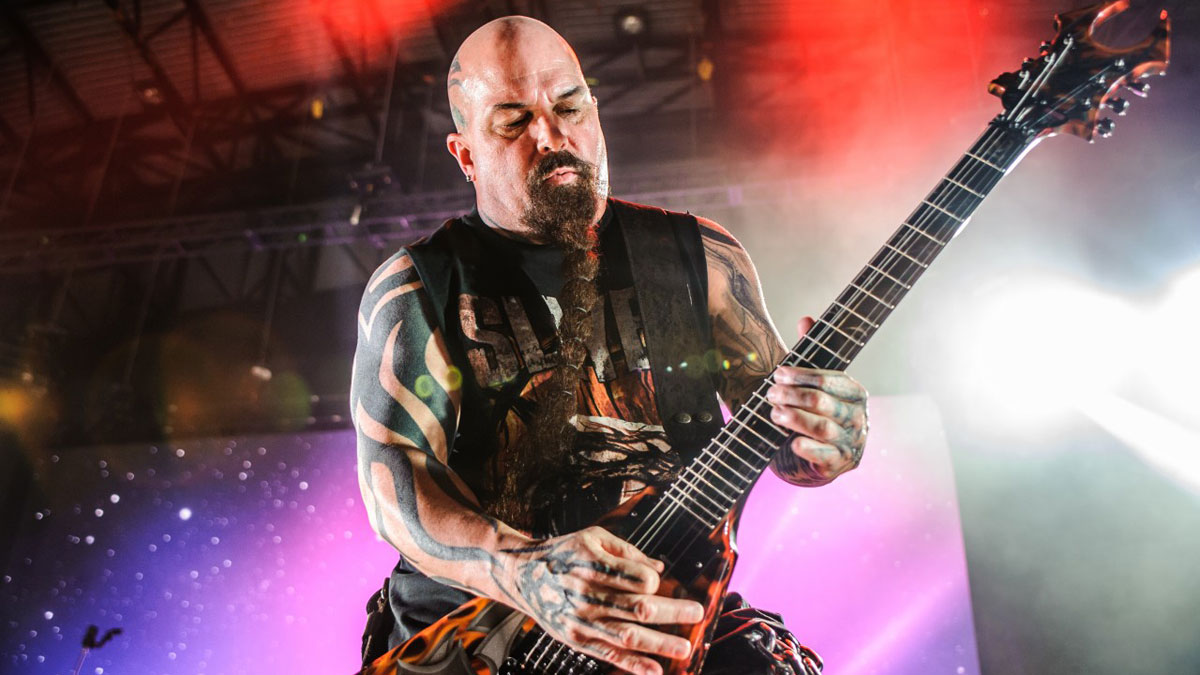
We need to talk about Jeff
It can’t have been easy writing an album after losing Jeff. What was going through your mind as you pieced together the new album?
Kerry: “I think the main difference for me was that I had to think about the parts Jeff would have added, which was a little weird. Even though Jeff put the punk into Slayer, I was the thrashy guy through our history. He did the Seasons In The Abyss, Dead Skin Mask kinda songs… the moody, spooky stuff. So that’s one thing I had to address on this record.
I didn’t want to try and do what Jeff did, but When The Stillness Comes was my first try and I was totally stoked with it
“I didn’t want to try and do what Jeff did or become him, but When The Stillness Comes was my first try and I was totally stoked with it. That song is one of the most chilling we’ve written in a while, so I’ve definitely got spooky covered now! I didn’t know for sure at first, but I definitely have it covered.”
And Gary, as a Slayer fan yourself, what were your favourite elements in Jeff’s playing?
Gary: “He really was one of a kind. Some people listen to his playing and think it’s this chromatic madness, but that’s the beauty of it. I can’t reproduce it!
“I’m self-taught but would still call myself a ‘schooled’ guitar player, I know what I’m doing and what most of it all means. With Jeff’s playing… let’s say I’d have an easier time learning Steve Vai licks! It’s that difficult.
“Someone might write online, ‘Oh Gary is ruining all of Jeff’s solos’. But that’s not who I am. I’m not the guy to reproduce it. There are a million tribute bands out there that do, they nail it perfectly. I try to respect the vibe that he had, so if he plays fast and chromatic, I’ll keep it in that vein. You need the classic bits!”
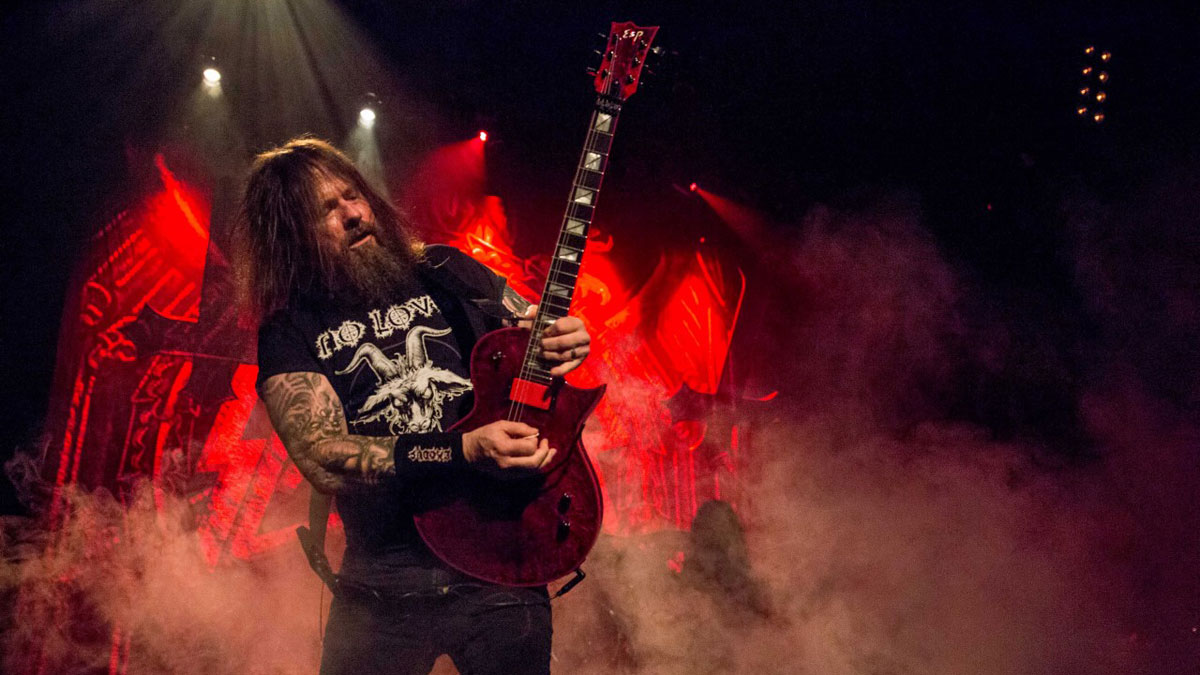
Keeping it chaotic
It must have felt pretty incredible to make your recording debut on Repentless?
Gary: “Well, it was one of those things. They’d been hard at work on the record for a long time and in between all of that, I was doing stuff with Exodus. I figured at some point they might call me!
“So the phone rings and it’s Kerry, saying, ‘Wanna come down and do some leads?’ And I was like, ‘Yeah, sure, I’m ready as I’ll ever be!’ So I went down and did all my tracking in one day. My time spent on the album was super brief, but I got it all done quickly so was happy with it!”
What would you say are the main differences in you both as players?
Gary is a shredder, so there were times I felt I had to man up and be awesome. Do not try to out-Holt Gary Holt!
Kerry: “My style is very archaic. I’m glad I didn’t know much about composing leads before I had to start making them up! I just went for it. So now there’s more thought to keys in certain situations, but I still do the barbaric stuff that sounds like chaos. That’s part of being Slayer!
“Gary is a shredder, so there were times I felt I had to man up and be awesome. Basically, do not try to out-Holt Gary Holt, ha ha! There was one song in particular, Cast The First Stone, where he came in and did this blazing lead. And so when I picked it up, I didn’t want to do the same thing!’ I played a particularly sparse lead, thinking they complement each other more that way. Others we trade off, he’s going and I’m going, you know? Guns blazing!”
Gary: “I think Kerry has far more discipline than I have. I don’t think I’m very disciplined at all. I guess I know my way around the fretboard, but even with recording, I’m always given the opportunity to re-do things, but I tend to leave it. That’s just me, I guess.
“Kerry will work his stuff out note-for-note and he’ll go out live and reproduce it note-for-note. I never know what I did, it’s all off the cuff because I like to be spontaneous. With me, you’ll get a similar version rather than the exact same thing. I know where I start and where I finish, let the chips fall where they may in between!”

Marshall men
So tell us about the rigs used to record the album, was it business as usual?
Kerry: “I’m very consistent. I don’t like to have any form of non-solidarity. To stick with something is a lot more commendable these days, rather than think about who can give you more money… I know a lot of people that do that and think less of them for it.
“If some kid buys my BC Rich because I play it and I start playing something else the next year, that kid’s not gonna be too stoked about that BC Rich anymore. I think about that, you know?
It’s a brutal amp with a really warm midrange. You know, Dimebag hated it!
“So it was that into my main Marshall head through Mode Four cabinets. It’s a brutal amp with a really warm midrange. You know, Dimebag hated it! It’s funny, because our sounds were quite similar.
“Course, he was a far better guitar player than me, but the way we constructed everything was totally fucking opposite. Dime loved his treble. I tried a [Krank] Krankenstein when they first came out, purely because he had one, and was like, ‘What’s up with all this treble, dude?!’”
Gary: “With Slayer, we’re a Marshall band. And the Marshall DSLs I used were incredible amps, which I had going into six cabs running all the time. I’ve got three different rigs, so it kinda depends on where I’m going, which band, if we’re flying, etcetera.
“I use an Engl rig with a full TC Electronic G-System for Exodus, which sounds pro and badass. I also have my Kemper rig, which has all my modded Marshalls and Engls profiled into it… it just depends on my mood.”
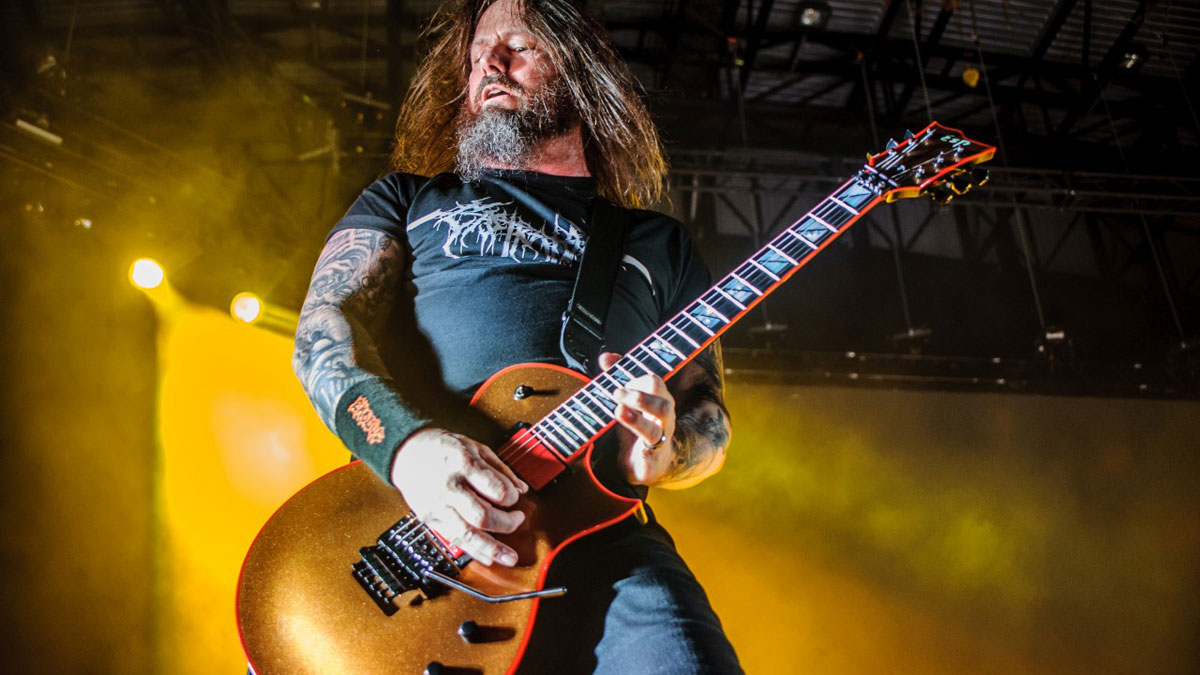
Wayward sons
We’ve often wondered: are there ever days off when you just fancy noodling over something different. A funk jam, perhaps?
Kerry: “Absolutely, but probably not funk! You’ll see Gary doing that, though. He’s a jack-of-all-trades, he plays everything. If I have my guitar plugged in, I’ll usually be working on some kind of new music.
I think it’s funny to put Salt-N-Pepa on when friends are over, pick up a guitar and play along!
“But when people come over and wanna listen to music most people like, say Michael Jackson or something, I’ll go pick up the guitar and learn the one Eddie Van Halen played on. I’ll do stupid shit like that.
“There’s this Salt-N-Pepa song, Push It, which got used in commercials and I think it’s funny to put that on when friends are over, pick up a guitar and play along! Everyone in the house just dies laughing. For clarity, you can turn that into a metal song.”
Gary: “I actually love plucking my way around with funk music. I’m not a master at it but I have a huge amount of respect for bands like The Time. Jesse Johnson is one of my favourite guitarists. And Prince is my number one musical hero, you know?
“When I’m at home, I’m far more likely to be listening to UFO than any thrash metal. When I’m at home, my clean settings actually get used! And Kerry’s knowledge of music goes way beyond what you’d expect from ‘the guy from Slayer’ to know! He’ll jam Carry On My Wayward Son for hours… he’s got that song down!”
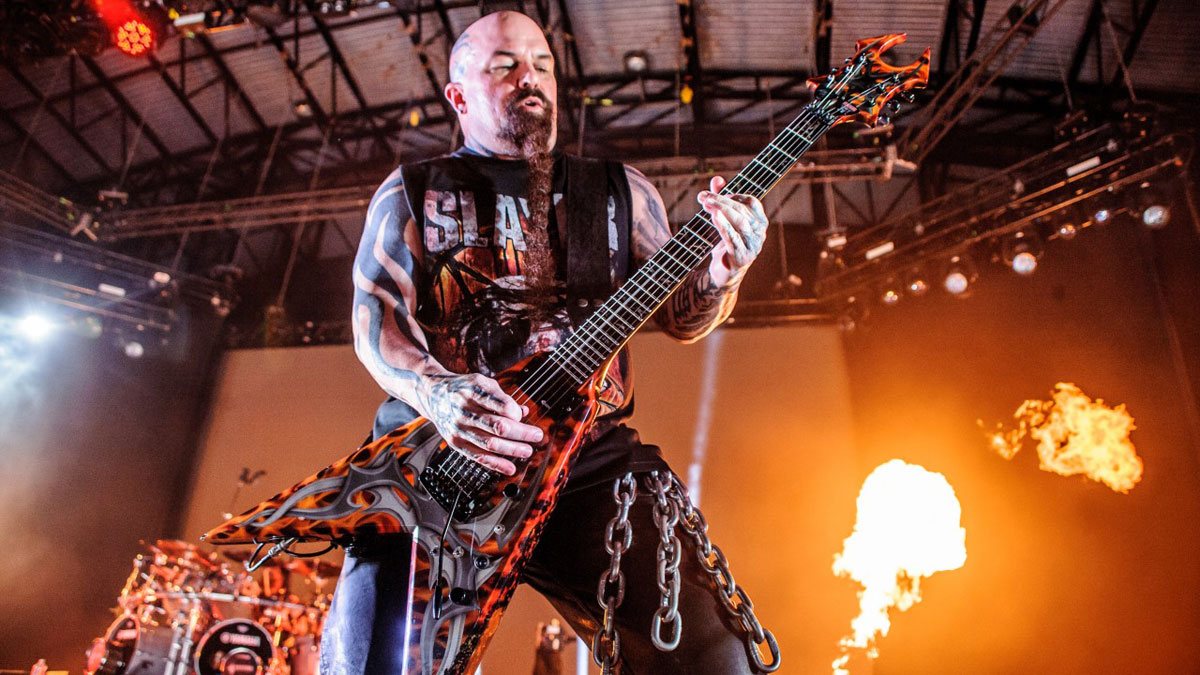
Thrash technique
It’s often said that the hardest thing about learning Slayer songs is the sheer speed of the right-hand rhythm picking… would you agree?
Kerry: “It’s certainly not a motion you’d use for anything other than that. There’s a certain technique involved and if you don’t have the right technique, you’ll never get fast enough. I think a lot of the shredder type players, and I don’t mean everybody, they’re not very good songwriters.
I played the tennis racquet long before I played the guitar. And I was pretty damn good at it. Maybe that helped…
“Players like Vai or Malmsteen spend their time perfecting what they do only as far as leads…Yngwie had a run where he did some good songs, but when it became just about how many notes he can fit in a millisecond?
“Don’t get me wrong, he’s an amazing player but after three songs, I’m done. He’ll just keep doing it faster on a different string. Rhythm guitar is where a song is constructed. If there’s a song you like, it’s because of that rhythm guitar. The lead stuff at the end of the day is just the icing.”
Gary: “You need to respect the amount of time to learn it because it is hard. Thrash metal was one movement with different offshoots and each band had its own particular NWOBHM influence.
“For Metallica it was Diamond Head. For Slayer and Exodus, the ones we gravitated to were faster, like Venom and Mercyful Fate. You know, I played the tennis racquet long before I played the guitar. And I was pretty damn good at it. Maybe that helped… I’m probably a better tennis racquet player than I am a guitar player!”
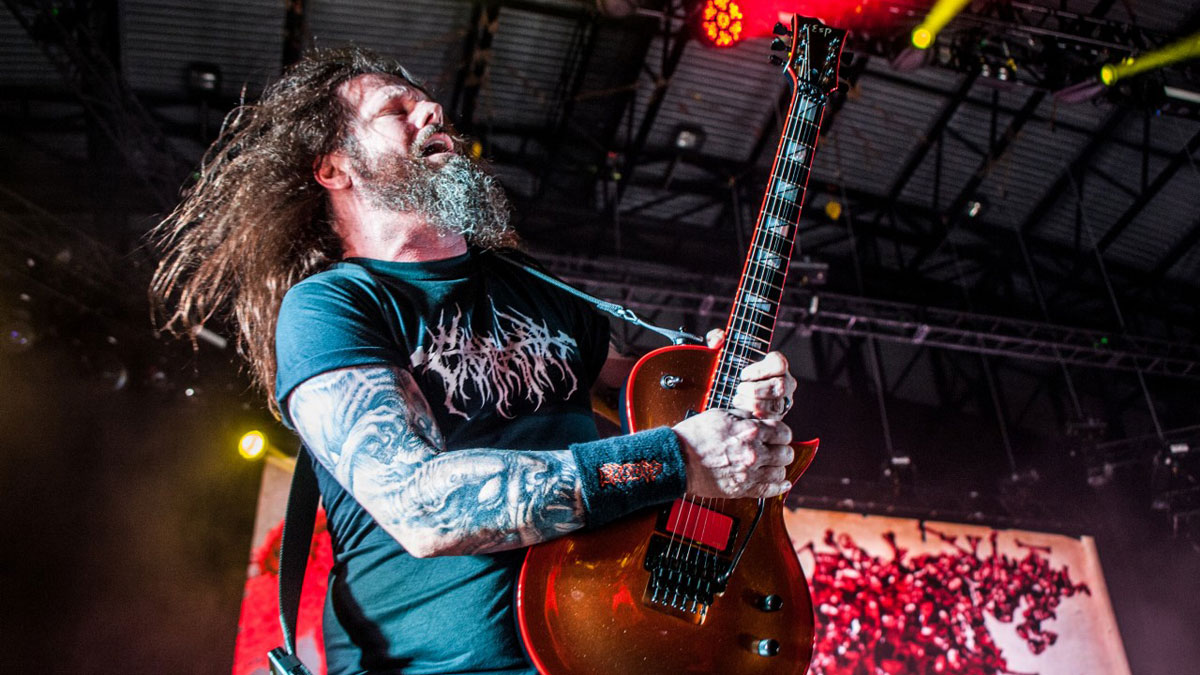
Future Slayer
And finally, what’s next for Slayer? Is there any truth to the rumours that you will be joining the band as an official member?
Gary: “It’s not something that I’ve given much thought to, or had any concern about… I’m perfectly happy with how I’m doing right now. I’ve always been made to feel like I was part of this family because we’re friends, going all the way back to being kids. Whatever happens, happens but I’ve certainly been very content the whole time.”
I see us going round the world a few times and then heading back into the studio for a one-two punch
Kerry: “From my perspective, this definitely won’t be our last record. There’s so much extra material, pretty much half a record waiting to be finished. Which is unheard of for us and puts us in a good spot.
“This record took a lot of time because of all the adversity we’ve faced since [last album] World Painted Blood. We had to figure things out. But I see us going round the world a few times and then heading back into the studio for a one-two punch. For the first time since the 90s… fuck that, since the 80s! We’ve had some big gaps, to get another album out in timely fashion would be awesome.”
Amit has been writing for titles like Total Guitar, MusicRadar and Guitar World for over a decade and counts Richie Kotzen, Guthrie Govan and Jeff Beck among his primary influences. He's interviewed everyone from Ozzy Osbourne and Lemmy to Slash and Jimmy Page, and once even traded solos with a member of Slayer on a track released internationally. As a session guitarist, he's played alongside members of Judas Priest and Uriah Heep in London ensemble Metalworks, as well as handling lead guitars for legends like Glen Matlock (Sex Pistols, The Faces) and Stu Hamm (Steve Vai, Joe Satriani, G3).


